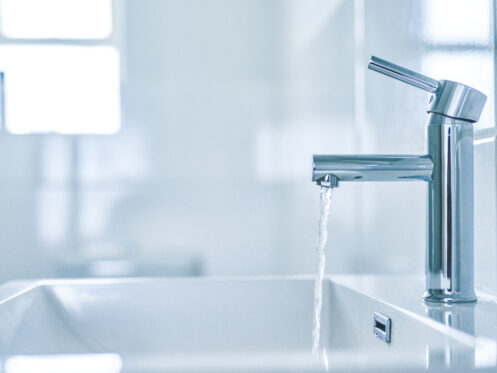You can test the water quality in your Pasadena, MD home using many methods, and there are countless reasons to do so. Although municipally treated water in Pasadena meets all state and federal standards, this doesn’t guarantee that it will meet your standards. Tap water in Anne Arundel County is notorious for its strong sulfur smell. Significant chlorine, chloramine, and other sanitizing agents are also present in the water. Local tap water travels through long, complex networks of supply pipes and picks up hard water minerals and other contaminants along the way. Read on to find out how you can determine the true safety and potability of what comes out of your taps.
The Basics: Sight, Smell, and Taste
Homeowners can and should test their water quality every day. This is done by simply paying attention to how your tap water looks, smells, and tastes. If your water has a pungent rotten egg smell, this is likely the result of hydrogen sulfide gas. Hydrogen sulfide gas enters residential plumbing systems via:
- Sulfur bacteria
- Poorly maintained water heaters
- Local air or groundwater pollution
If your hot water smells like rotten eggs but your cold water does not, it may be time to replace your water heater’s sacrificial anode rod or have it flushed and serviced. If both your hot and cold water smell like sulfur, schedule a whole house leak detection evaluation. You may have a water supply line leak letting outside contaminants in.
Cloudy and Discolored Water
Your tap water should never look brown, yellow, or rusty. Discoloration is caused by discolored pipes, supply line leaks, or other sources of contamination. Cloudy water could be the result of contamination as well. However, it’s most commonly caused by aeration, in which case it should settle and become clear within just 30 to 90 seconds. If it does not, your tap water might be loaded with dissolved particulates.
Foul-Tasting Water
Sudden changes in how your tap water tastes are also cause for alarm. You might taste impurities like dissolved salts, pesticides, or nitrates, or your water may be rife with potentially harmful microorganisms. Whenever your water looks, smells, or tastes strange, turn your taps off and call a plumber.
Certified Labs
Certified lab testing is one way to test your home’s water quality. According to the United States Environmental Protection Agency (EPA), this is far more effective than buying an at-home water testing kit.
First, find a lab that performs water quality testing, collect a sample of your water, and send it off. Then within a matter of days or weeks, you’ll get a detailed water quality report. You can share this report with your plumber to find the right interventions. You might need whole-house water softening to address high concentrations of dissolved minerals like calcium or magnesium or whole-house water filtration to extract chemical contaminants.
Hire a Trusted Plumbing Company
The best way to test your water quality and address water quality issues is to schedule testing with a licensed plumbing company. Maryland plumbers understand the most common water quality concerns in the region. They use tests that look for the contaminants most likely to affect local tap water.
With water quality testing from a plumber, you can assess your water’s hardness and learn more about the many contaminants deemed legally allowable at certain concentrations. Although the EPA has established legal limits for aluminum, ammonia, mercury, chromium, and certain other common contaminants, these limits haven’t been adjusted in more than two decades. More importantly, the legal limits for common chemical contaminants aren’t always the safe limits.
Get the Data You Require and a Needs-Specific Solution
Plumbers can provide both insight into your water quality and needs-specific solutions. Common interventions include whole-house water filtration that extracts sanitizing agents and other waterborne contaminants, backflow preventers, water line repairs, and repiping services for homeowners with aging or damaged pipes. Plumbers know that water quality concerns can result from insufficient municipal water treatment or existing plumbing problems.
The Benefits of Whole-House Water Filtration
If your plumbing system is in top condition but your water quality is poor, whole-house water filtration will improve your water quality at every tap. Whole-house water filters remove many of the residual contaminants from municipal treatment as well as the pollutants introduced by aging pipes. With a whole-house water filter, you’ll have cleaner water for cooking, bathing, and drinking. This can mean:
- Healthier skin and hair
- Better-tasting cooked foods
- Less digestive upset
- Lower risk of contaminant-related illness
Even intentional additions to tap water like fluoride, chloramine, and chlorine can cause long-term health issues affecting the kidneys, liver, brain, heart, and respiratory system.
We’re committed to helping residents of Pasadena optimize their water quality. We offer top-notch leak detection, repiping, water line repair, and general plumbing services. We also provide sewer line camera inspections, drain cleaning, and water heaters. To schedule water quality testing or learn more about whole-house water filtration, contact Priority Plumbing & Drain today.





